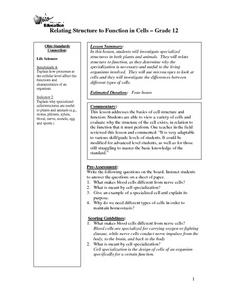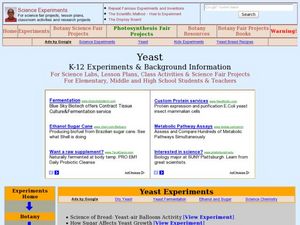Cellular Structure Teacher Resources
Find Cellular Structure lesson plans and worksheets
Showing 839 resources
Curated OER
Survival: The Human Body in Extreme Environments
Students create a list of signs the human body gives during threatening weather conditions. They investigate the causes and conditions of dehydration, overheating, and hypothermia.
Curated OER
Genetics and Genetic Engineering
Pretty purple slides present a plethora of jargon related to genetic engineering. Most of them have one term across the top and a brief explanation of that term below. They are arranged in alphabetical order, which may not be the most...
Curated OER
Bacterial Transformation
High schoolers discuss a bacterial experiment they previously performed and complete a pre-assessment. They participate in a lecture discussion given by the teacher through PowerPoint and then complete a cartoon worksheet and...
Curated OER
The Cell
Students visualize plant and animal cells, explain the parts of a cell and their functions and distinguish plant cells from animal cells. Working Students, in groups, must present a particular portion of a cell to the entire class.
Curated OER
Relating Structure to Function in Cells
Twelfth graders investigate specialized structures in both plants and animals. They relate structure to function, as they determine why the specialization is necessary and useful to the living organisms involved. They use microscopes...
Curated OER
Bread Cells
Fifth graders examine plant and animal cells. In this plant and animal cell lesson, 5th graders define what cells are, label their parts, and describe how plant and animal cells are different. They observe cells at a number of web sites,...
Curated OER
Cells All Around
Students measure the size of an epithelial cell and to estimate the number of epithelial cells in a given area of the body. After watching a video on cells, student groups perform an experiment using a microscope to view some of their...
Curated OER
Plant and Animal Cells - Are they Different?
Learners observe the similarities and differences between plant and animal cells. In this cell activity, students use microscopes to observe self prepared slides of animal and plant cells.
Curated OER
Surface to Volume Ratios
Students measure the rate of diffusion and to calculate the surface area to volume ratios of varying cell sizes. The instructional activity is very clearly organized with a useful student worksheet provided. They perform a lab experiment...
Curated OER
Cells, Cells, Cells
Students explore plant and animal cells. Using household items, students create a three-dimensional model of a plant or animal cell. Students identify and label each cell part.
Curated OER
Journey to the Center of a Cell
Ninth graders create a large scale model of a eukaryotic cell. In this biology lesson, 9th graders identify the different parts and function of the cells by using a robot to navigate through the cell models. They create a video tutorial...
Curated OER
DNA Extraction
Students extract and observe a visible amount of DNA from Escherichia. coli cells. They discuss the properties of DNA. Confirmation of the presence of DNA by a reaction with an indicator is confirmed within this lesson. Many hands-on...
Curated OER
Slimy Cells
Students create three-dimensional cell models. They may choose to make either a plant or animal cell but must use a Ziploc bag as the cell membrane, slime for the cytoplasm, and strawberry baskets for the cell wall if making a plant...
Curated OER
Travel Brochure for a Cell
Learners create a brochure to entice readers to 'visit' their cell organelles and functions 'amusement park'. Students use humor and 'roadside attractions' for an inspiration - 'visit the ribosomes to watch proteins synthesized before...
Curated OER
Human Epidermal Cells
Young scholars explore epidermal cells. After following specified procedures for removing epidermal cells from their wrist, students view the cells with the use of a microscope. After creating a drawing of their observation, young...
Curated OER
Standard 4 Review Sheet-Genetics and Inheritance
In this genetics worksheet, students answer a variety of questions about inheritance, DNA, the genetic code, genes, sexual and asexual reproduction, mutations, protein synthesis and genetic engineering.
Curated OER
Lesson on Proteins
Students examine the importance of proteins including their function and structure. In this protein lesson students play a game to help them better understand proteins.
Curated OER
Yeast
Students study the characteristics of yeasts. In this biology lesson, students conduct experiments to measure yeast respiration. They discuss the favorable conditions needed for growing them.
Curated OER
Immune System: The Master of Self-Defense
Students examine the role of the immune system in the human body. They conduct a hand-washing experiment, answer questions while viewing videos, discuss key vocabulary, draw and label illustrations, and observe demonstrations and record...
Curated OER
Using computers in the content area
Students practice grade appropriate computer basics and integrate them into the curriculum areas. in this technology lesson, students understand correct behaviors while using the computer. Students become familiar with the Internet...
Curated OER
How Does a Green Plant Grow?
Students of all ages can explore the question "how do seeds grow?", design an experiment to answer the question, predict the outcome of the experiment then conduct the experiment.
Curated OER
It's Alive! Using Microorganisms in Cooking
Students create a KWL chart about food. In this chemistry lesson, students differentiate physical and chemical changes. They explain how microorganisms are used in food preparation.
Curated OER
Genetics and Genetic engineering
The details and definitions of Biotechnology and genetic engineering are very useful, but this is a very long PowerPoint with no images or ways of breaking up the information. The slides are nicely composed and relevant, so this could be...
Curated OER
Science Unit Lesson Five
Sixth graders review how and which plants operate in terrariums. In groups, they follow instructions to make their own terrarium and place different types of plants in it. To end the lesson plan, they review the steps in the water cycle...

























